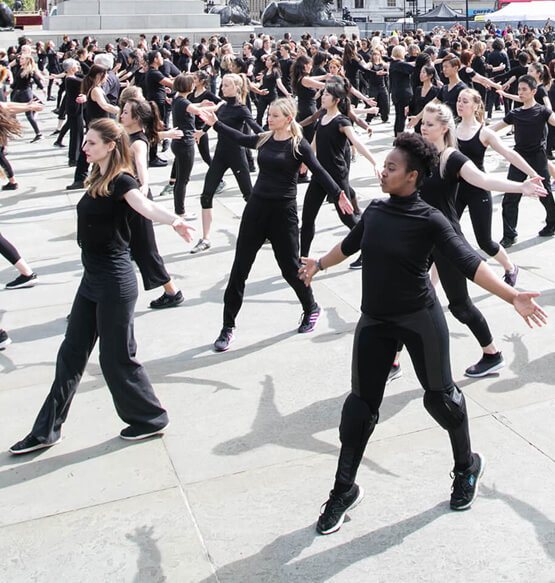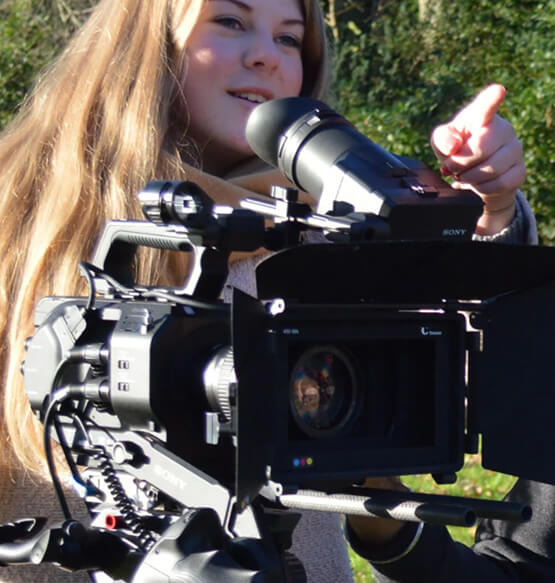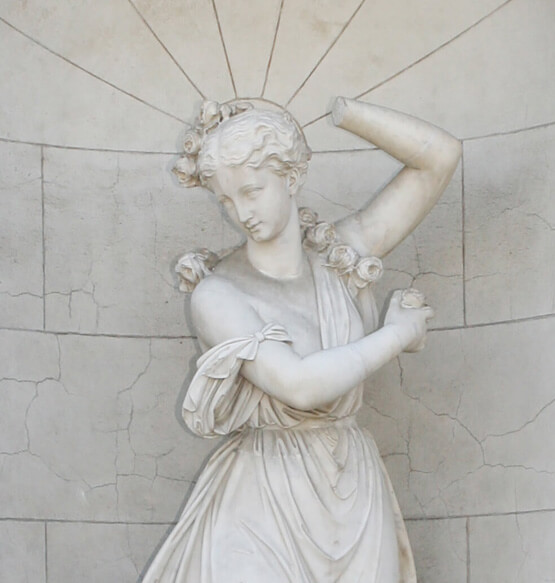Duration:
MA - 1 year
MFA - 2 years
Number of credits:
MA - 180 credits
MFA - 240 credits
Start date(s):
September 2026
Explore and refine your artistic voice, and choose a programme that will propel your innovative arts career.
Responding to an evolving arts landscape, this programme blends creative, technical, digital, professional, and entrepreneurial skills. Through dynamic practical work, industry-focused learning, and critical exploration, you’ll refine and apply choreographic and dance practices across a range of contexts.
You’ll explore choreography both for its artistic potential and for its relevance to today’s social and political questions. As a graduate, you’ll leave with the practical capabilities to thrive in the arts sector and with the vision to drive meaningful change, expanding the reach of choreography across stage, screen, policy, and social action.

Why choose MFA Choreography at Roehampton?

Cultivate a distinct artistic voice: Grow your choreographic practice in an environment that welcomes diverse backgrounds, cultural perspectives, and individual artistic identities.
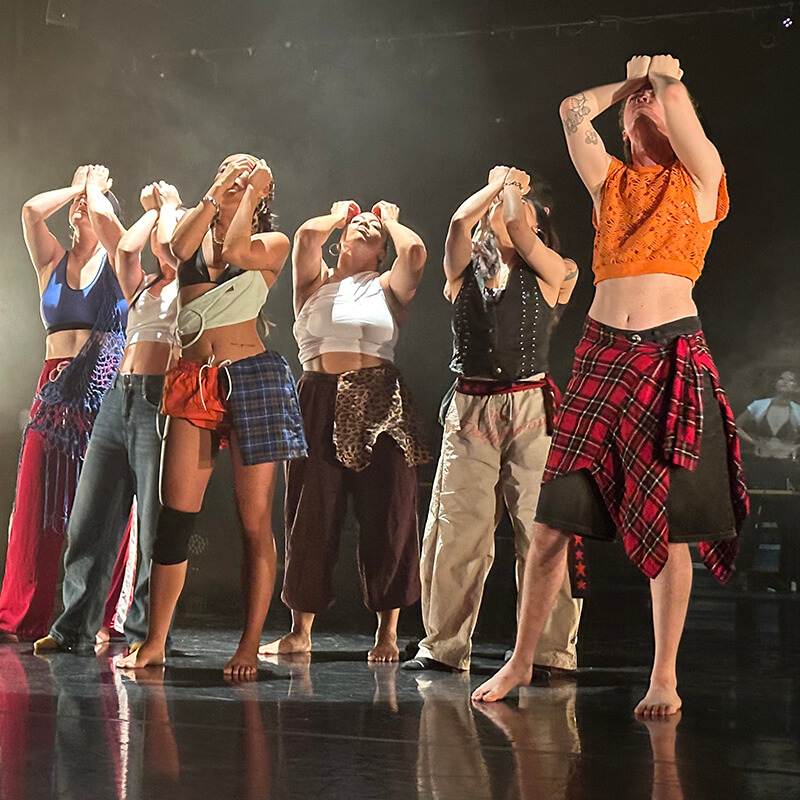
Integrate creative, critical, and contextual learning: Explore historical and contemporary choreographic practices, engage with artistic, ecological, and social issues, and develop both practical and theoretical skills through world-class facilities and expert teaching.
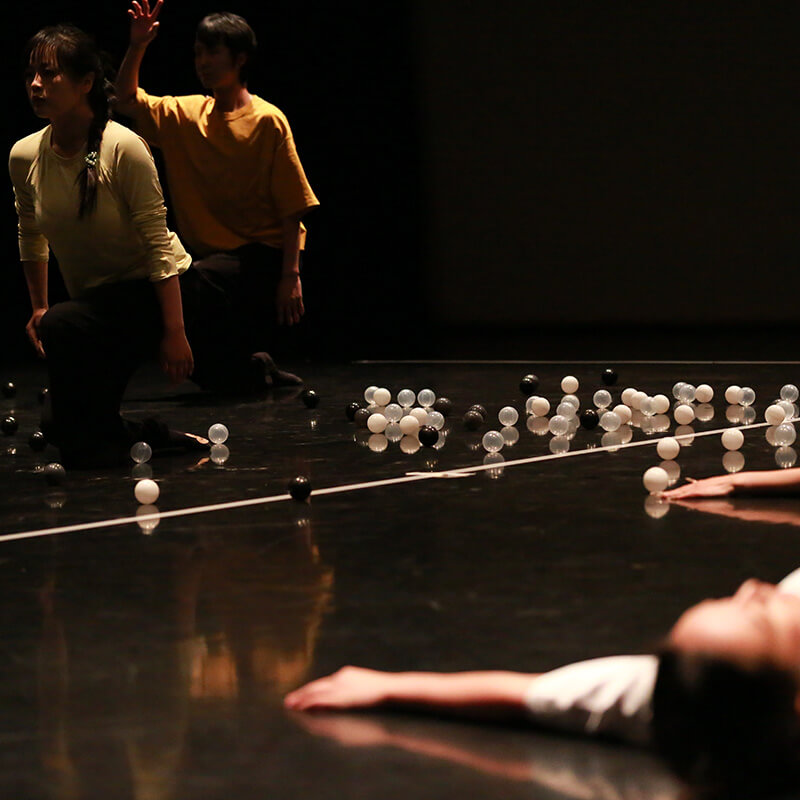
Prepare for professional, industry-recognised pathways: Gain real-world experience through industry-aligned assessments, interdisciplinary collaboration, and opportunities such as Tallescope certification, culminating in a substantial independent graduation project that supports your future career.
Module overview
These practical classes provide a framework for you to explore movement potential using a variety of approaches. Technical, performance, improvisational and interpretative skills are addressed using the interplay between action, imagination, observation and questioning.
You will be encouraged to reflect on your own practices as dancers and to find ways to explore detailed kinesthetic awareness through testing (trial and error) and to define how movement is experienced in relation to space, time and gravity. You will be involved in expressive and interpretative tasks in response to music, sound accompaniment or text and work with other dancers to locate synergies and sensitivity in your danced relationships.
You will experience a variety of practices as part of the portfolio. The approach and demands of each class will vary according to the interests and expertise of each tutor offering a range of experiences from within the professional field.
Teaching and learning
The delivery of this modules is four, one and half hour practical studio sessions per week.
There will be an additional 30 minutes of digital support per week. This will consist of audio-visual resources that accompany and support the practice delivery.
Teaching practice is aligned with the core principles of UDL and our philosophy is to be inclusive, respectful and accessible to all. Practical classes, workshops, peer review and tutorials. Peer review and critical feedback will be included in all sessions and tutorials can be booked during office hours.
Formative feedback is inherent in the delivery of a dance practice sessions and provided through manifold embodied perspectives covering the full range of learning styles, including physical/kinaesthetic, aural/auditory-musical, visual/spatial, verbal/linguistic, logical/anatomy-somatic, intra and interpersonal approaches.
Furthermore, every session involves tasks and/or mini projects which provide opportunities for peer and tutor feedback and formative learning.
Group and individual tutorials outside of the taught sessions offer opportunities to discuss individual interests, challenges and projects.
Assessment
This module will be assessed using a practical class 1 (30%) and a practical 2 (50%).
Module overview
This module develops the work studied in Dance Practice. Approaching Performance and will deepen technical and artistic understanding and their exploration of movement potential using a range of practices.
You will critically interrogate your technical knowledge of dancing and deepen your awareness of communicating movement. You will be involved in expressive and interpretative tasks in response to music, sound accompaniment or text and work with other dancers to locate synergies and sensitivity in their danced relationships. Focus will be on performative qualities alongside essential technical practice.
Via a performative presentation, you can demonstrate advanced performance skills and the problems and possibilities of ‘being seen’ (Deborah Hay) considering ‘dancing as an ensemble’ as well as the performer-audience relationship.
You will experience a variety of practices as part of the portfolio. The approach and demands of each class will vary according to the interests and expertise of each tutor offering a range of experiences from within the professional field.
Teaching and learning
This module consists of four, one and a half dance studio practice classes per week
Teaching practice is aligned with the core principles of UDL and our philosophy is to be inclusive, respectful and accessible to all.
Practical classes, workshops, peer review and tutorials. Peer review and critical feedback will be included in all sessions and tutorials can be booked during office hours.
Formative feedback is inherent in the delivery of a dance practice sessions and provided through manifold embodied perspectives covering the full range of learning styles, including physical/kinaesthetic, aural/auditory-musical, visual/spatial, verbal/linguistic, logical/anatomy-somatic, intra and interpersonal approaches.
Every session involves tasks and/or mini projects which provide opportunities for peer and tutor feedback and formative learning.
Group and individual tutorials outside of the taught sessions offer opportunities to discuss individual interests, challenges and projects.
There will be an additional 30 minutes of online digital support per week. This will consist of audio-visual resources that accompany and support the practice delivery.
Assessment
This module will be assessed using a practical dance class (50%) and a performative studio presentation (50%).
Module overview
This interdisciplinary module provides a dynamic exploration of ways in which choreography, media and the environment intersect in the 21st century, fostering critical inquiry and creative practice across a range of disciplines.
It invites you to reimagine choreography as not only embodied performance but also as a site for creative engagement with diverse media, and to work with others in diverse environmental contexts.
In response to global challenges, the module addresses how shifting social, political, and ecological environments may require new forms of critical thinking, collaboration, and creative practice. Through the lens of post-humanist theory, including material cultures, new materialism and Anthropocene concepts, the module emphasises the relational ontology of the world, where human-centric views are de-centered, and the embodied interactions between people, non-human entities, and ecosystems are highlighted.
You will engage with choreography as a practice that transcends traditional boundaries, incorporating both material and digital realms while embracing the interconnectedness of all living systems. This approach also emphasises the importance of community building on a global scale, inviting you to understand how your work might respond to the environmental and socio-political forces shaping our world today.
Teaching and learning
This is a year-long module, consisting of one, two-hour session per week.
This extended structure addresses the multi-layered nature of the module, in which you will learn to produce a group project in response to a mediated environment and tools, as well as to curate and produce an exhibition at the end of the spring at a high professional standard, which aligns with the aim or professionalisation.
Practical workshops will cover the compositional and choreographic practice, while seminars will consist of hybrid exploration of the contextual understanding of choreography more broadly.
Seminars and practical site-specific (and medium-specific) workshops will embed collaborative formative tasks, tutorials and peer review. There will be technical workshops (such as filming, editing, Adobe Cloud Suite as well as drawing and collaging for performance).
To contextualise and generate new creative approaches, the module will include dedicated field trips to cultural centres and performance art spaces (e.g., the ICA, Tate Modern, the Barbican), as well as to natural environments (e.g., discovering new spaces at Roehampton campus, and London ecological sites (such as, Richmond Park, Barnes Wetlands, Kew Gardens and others).
Assessment
This module will be assessed using a production portfolio (40%) and a mediated / site-specific choreography project (50%).
Module overview
This module interrogates practically and theoretically the question of what happens when we have a creative encounter. It investigates what happens when we have a creative encounter with others, such as established and novel lines of enquiry for dancers and performers; encounters in new settings in and outside of dance; and in and with institutions such as museums; work with and for different communities; and critical artistic engagement with past and present contexts.
It investigates how we might engage together in a creative practice and queries why a practice might be important, or excluding, or lean into an embodied, relational engagement necessary to create the work we are passionate about.
The module will explore topics that put the creative encounter front and centre, for example, leadership and collaboration, working with other professional artists and those who come to dance for the first time; delving into the topics of cultural heritage and community; institutional contexts and working through how we use creative practice to engage with topics such as care, socially engaged facilitation, audience relation, direction, producing, curating; showcasing topics connected to why we do this, for example to make an impact on health, empowerment, society, audiences, institutions, cultural engagement and interpretation; creating the ‘what if...’, using our imaginations to set up creative encounters as dance activists, artists, vision-makers of the future.
Teaching and learning
This is a year-long module, consisting of one, two-hour seminar, workshop or experiential laboratory per week.
The sessions will be a mixture of practical and theoretical engagement and indicated clearly to students.
There will be an additional 30 minutes of online digital support per week. This will consist of audio-visual resources will deepen understanding and support practice and thinking.
Assessment
This module will be assessed using a digital exposition (50%) and a project presentation (50%).
Module overview
This module creates a foundation to hold your existing skills and advance your development. Key to this module is supporting you to refine your own artistic identity by developing practical and contextual awareness that will advance a range of stylistic interests.
Skill development occurs by discussing contextual artistic and industry practices in relation to a range of thematic approaches, which are also explored practically in the studio and through independent and collaborative research tasks.
You will be introduced to a range of choreographic and related practices by a range of artists. Whilst these references have a Western emphasis they include artists from a range of backgrounds, including practices from the global south and a range of identitarian experience, and who demonstrate a range of approaches to the choreographic from formal to expressive to conceptual.
Focus on independent research gives you the opportunity to draw on, and apply in greater depth, techniques and approaches explored in first year modules ‘Dance Practice’, ‘Approaching Performance’ and ‘Creative Encounters’.
For example, an approach to embodiment in ‘Dance Practice’ might be engaged within a choreographic structure in Choreography: you will be supported to make autonomous decisions in exploring points of intersection across modules.
Experiment is encouraged within a robust framework of support. Inherent to developing choreographic skills is enhancing your working knowledge of dramaturgy and capacities of observation, responsiveness and critical awareness in constructing self/peer review and feedback.
Regular sharing of choreographic explorations and peer feedback are a key component of the module. This module supports you to refine your choreographic voice to become the most confident version of yourself as a choreographer, setting you up for the substantial ‘Choreographic Project’ in your second year.
Teaching and learning
This is a year-long module, consisting of one, two-hour workshop per week
Workshops will consist of discussion and practical exploration. There will be an additional 30 minutes of online digital support per week. This will consist of audio-visual resources that support the delivery of workshops and independent student research.
Weekly sessions typically take a hybrid form encompassing lecture presentations, seminars, practical workshops, individual and collaborative practical tasks, feedback models, sharing of independent research and tutorials.
Key assessment points are allocated during the year, typically at the end of each semester, and alongside regular formative assignments. Typically, we include one single-day workshop per semester led by a professional choreographer, including one hour discussion of their professional journey.
As you develop your choreographic practice, you will be supported to verbally articulate choreographic and wider artistic rationale in your work. These skills of verbal articulation (spoken and written) are essential to professional development and employability as choreographers are required to represent their work to programmers, other artists and general publics through a range of word-based formats.
Field trips make use of access to the wide range of organisations, venues and events that London offers, and support connection to the professional field.
Assessment
This module will be assessed using a chorographic sketch and written statement (50%) and a choreographic sketch and written statement (50%).
This module offers you the opportunity to conceive, plan and realise a substantial outward facing project; a chance to apply the skills they have learned to their chosen areas of interest. You are supported to create and document an industry-ready project to support their transition into the professional world. The project will focus on either choreography, or independent practice research in order to deliver a range of materials relating to your interests as dance practitioners (including classes, workshops. screendances, installations, and performances), and will capture the unique vision of each student, whilst locating it within current practices. You will be supported to articulate how your project relates to and contributes to the current professional field. You are encouraged to examine, respond to and reinvent approaches to their field of focus, which might include working with knowledges unique to aspects of lived experience, and responding to the political, social and philosophical implications of your methods of working as well as the finally realised project. Experiment is encouraged within a robust framework of support.
You will engage a combination of specialist, transferrable and soft skills, the latter including project management and collaborative strategies. You are supported to envision and realise their projects through a combination of one-to-one and small group tutorials, peer review and workshops, including individual and collaborative tasks.
These are the current planned modules on this course and may be subject to change.
Module overview
These practical classes provide a framework for you to explore movement potential using a variety of approaches. Technical, performance, improvisational and interpretative skills are addressed using the interplay between action, imagination, observation and questioning.
You will be encouraged to reflect on your own practices as dancers and to find ways to explore detailed kinesthetic awareness through testing (trial and error) and to define how movement is experienced in relation to space, time and gravity. You will be involved in expressive and interpretative tasks in response to music, sound accompaniment or text and work with other dancers to locate synergies and sensitivity in your danced relationships.
You will experience a variety of practices as part of the portfolio. The approach and demands of each class will vary according to the interests and expertise of each tutor offering a range of experiences from within the professional field.
Teaching and learning
The delivery of this modules is four, one and half hour practical studio sessions per week.
There will be an additional 30 minutes of digital support per week. This will consist of audio-visual resources that accompany and support the practice delivery.
Teaching practice is aligned with the core principles of UDL and our philosophy is to be inclusive, respectful and accessible to all. Practical classes, workshops, peer review and tutorials. Peer review and critical feedback will be included in all sessions and tutorials can be booked during office hours.
Formative feedback is inherent in the delivery of a dance practice sessions and provided through manifold embodied perspectives covering the full range of learning styles, including physical/kinaesthetic, aural/auditory-musical, visual/spatial, verbal/linguistic, logical/anatomy-somatic, intra and interpersonal approaches.
Furthermore, every session involves tasks and/or mini projects which provide opportunities for peer and tutor feedback and formative learning.
Group and individual tutorials outside of the taught sessions offer opportunities to discuss individual interests, challenges and projects.
Assessment
This module will be assessed using a practical class 1 (30%) and a practical 2 (50%).
Module overview
This module interrogates practically and theoretically the question of what happens when we have a creative encounter. It investigates what happens when we have a creative encounter with others, such as established and novel lines of enquiry for dancers and performers; encounters in new settings in and outside of dance; and in and with institutions such as museums; work with and for different communities; and critical artistic engagement with past and present contexts.
It investigates how we might engage together in a creative practice and queries why a practice might be important, or excluding, or lean into an embodied, relational engagement necessary to create the work we are passionate about.
The module will explore topics that put the creative encounter front and centre, for example, leadership and collaboration, working with other professional artists and those who come to dance for the first time; delving into the topics of cultural heritage and community; institutional contexts and working through how we use creative practice to engage with topics such as care, socially engaged facilitation, audience relation, direction, producing, curating; showcasing topics connected to why we do this, for example to make an impact on health, empowerment, society, audiences, institutions, cultural engagement and interpretation; creating the ‘what if...’, using our imaginations to set up creative encounters as dance activists, artists, vision-makers of the future.
Teaching and learning
This is a year-long module, consisting of one, two-hour seminar, workshop or experiential laboratory per week.
The sessions will be a mixture of practical and theoretical engagement and indicated clearly to students.
There will be an additional 30 minutes of online digital support per week. This will consist of audio-visual resources will deepen understanding and support practice and thinking.
Assessment
This module will be assessed using a digital exposition (50%) and a project presentation (50%).
Module overview
This module creates a foundation to hold your existing skills and advance your development. Key to this module is supporting you to refine your own artistic identity by developing practical and contextual awareness that will advance a range of stylistic interests.
Skill development occurs by discussing contextual artistic and industry practices in relation to a range of thematic approaches, which are also explored practically in the studio and through independent and collaborative research tasks.
You will be introduced to a range of choreographic and related practices by a range of artists. Whilst these references have a Western emphasis they include artists from a range of backgrounds, including practices from the global south and a range of identitarian experience, and who demonstrate a range of approaches to the choreographic from formal to expressive to conceptual.
Focus on independent research gives you the opportunity to draw on, and apply in greater depth, techniques and approaches explored in first year modules ‘Dance Practice’, ‘Approaching Performance’ and ‘Creative Encounters’.
For example, an approach to embodiment in ‘Dance Practice’ might be engaged within a choreographic structure in Choreography: you will be supported to make autonomous decisions in exploring points of intersection across modules.
Experiment is encouraged within a robust framework of support. Inherent to developing choreographic skills is enhancing your working knowledge of dramaturgy and capacities of observation, responsiveness and critical awareness in constructing self/peer review and feedback.
Regular sharing of choreographic explorations and peer feedback are a key component of the module. This module supports you to refine your choreographic voice to become the most confident version of yourself as a choreographer, setting you up for the substantial ‘Choreographic Project’ in your second year.
Teaching and learning
This is a year-long module, consisting of one, two-hour workshop per week
Workshops will consist of discussion and practical exploration. There will be an additional 30 minutes of online digital support per week. This will consist of audio-visual resources that support the delivery of workshops and independent student research.
Weekly sessions typically take a hybrid form encompassing lecture presentations, seminars, practical workshops, individual and collaborative practical tasks, feedback models, sharing of independent research and tutorials.
Key assessment points are allocated during the year, typically at the end of each semester, and alongside regular formative assignments. Typically, we include one single-day workshop per semester led by a professional choreographer, including one hour discussion of their professional journey.
As you develop your choreographic practice, you will be supported to verbally articulate choreographic and wider artistic rationale in your work. These skills of verbal articulation (spoken and written) are essential to professional development and employability as choreographers are required to represent their work to programmers, other artists and general publics through a range of word-based formats.
Field trips make use of access to the wide range of organisations, venues and events that London offers, and support connection to the professional field.
Assessment
This module will be assessed using a chorographic sketch and written statement (50%) and a choreographic sketch and written statement (50%).
Module overview
This module develops the work studied in Dance Practice. Approaching Performance and will deepen technical and artistic understanding and their exploration of movement potential using a range of practices.
You will critically interrogate your technical knowledge of dancing and deepen your awareness of communicating movement. You will be involved in expressive and interpretative tasks in response to music, sound accompaniment or text and work with other dancers to locate synergies and sensitivity in their danced relationships. Focus will be on performative qualities alongside essential technical practice.
Via a performative presentation, you can demonstrate advanced performance skills and the problems and possibilities of ‘being seen’ (Deborah Hay) considering ‘dancing as an ensemble’ as well as the performer-audience relationship.
You will experience a variety of practices as part of the portfolio. The approach and demands of each class will vary according to the interests and expertise of each tutor offering a range of experiences from within the professional field.
Teaching and learning
This module consists of four, one and a half dance studio practice classes per week
Teaching practice is aligned with the core principles of UDL and our philosophy is to be inclusive, respectful and accessible to all.
Practical classes, workshops, peer review and tutorials. Peer review and critical feedback will be included in all sessions and tutorials can be booked during office hours.
Formative feedback is inherent in the delivery of a dance practice sessions and provided through manifold embodied perspectives covering the full range of learning styles, including physical/kinaesthetic, aural/auditory-musical, visual/spatial, verbal/linguistic, logical/anatomy-somatic, intra and interpersonal approaches.
Every session involves tasks and/or mini projects which provide opportunities for peer and tutor feedback and formative learning.
Group and individual tutorials outside of the taught sessions offer opportunities to discuss individual interests, challenges and projects.
There will be an additional 30 minutes of online digital support per week. This will consist of audio-visual resources that accompany and support the practice delivery.
Assessment
This module will be assessed using a practical dance class (50%) and a performative studio presentation (50%).
Module overview
This module invites you to interrogate artistic and performance practices, including your own modes of making, as forms of research discovery. It explores the relations between practice and different forms of codified and non-codified knowledge from the perspective of practitioners in dance, performance or other creative practices; and through exploration of concepts, theories and assumptions which underpin and inform performance.
Combining practice-as-research methodologies with philosophical enquiry, you will be challenged to deploy a range of critical research methodologies which combine the kinaesthetic, the self-reflective and the theoretical.
The module supports you to understand how artistic processes can be used to generate and embrace a multiplicity of conceiving, engaging and generating knowledges. Key topics include the nature of performance as art, epistemology, and the aesthetics and ethics of dance and performance, including the questioning of power structures within the field. These issues are examined through a combination of readings, discussions, practical tasks and embodied experiences, providing space to consider the cultural, political and ethical ramifications of performance practices in studio-based, classroom-based and hybrid settings.
Teaching and learning
This module is taught through a one, two-hour seminar and one, two-hour hybrid session per week.
Lecture and seminars will cover philosophical examinations of performance, while hybrid sessions interrogate the nature of artistic practices as a method of research.
There will be an additional 30 minutes of online digital support per week. This will consist of audio-visual resources will deepen understanding and support practice and thinking.
Assessment
This module will be assessed using a presentation (50%) and a blog (50%).
Module overview
This interdisciplinary module provides a dynamic exploration of ways in which choreography, media and the environment intersect in the 21st century, fostering critical inquiry and creative practice across a range of disciplines.
It invites you to reimagine choreography as not only embodied performance but also as a site for creative engagement with diverse media, and to work with others in diverse environmental contexts.
In response to global challenges, the module addresses how shifting social, political, and ecological environments may require new forms of critical thinking, collaboration, and creative practice. Through the lens of post-humanist theory, including material cultures, new materialism and Anthropocene concepts, the module emphasises the relational ontology of the world, where human-centric views are de-centered, and the embodied interactions between people, non-human entities, and ecosystems are highlighted.
You will engage with choreography as a practice that transcends traditional boundaries, incorporating both material and digital realms while embracing the interconnectedness of all living systems. This approach also emphasises the importance of community building on a global scale, inviting you to understand how your work might respond to the environmental and socio-political forces shaping our world today.
Teaching and learning
This is a year-long module, consisting of one, two-hour session per week.
This extended structure addresses the multi-layered nature of the module, in which you will learn to produce a group project in response to a mediated environment and tools, as well as to curate and produce an exhibition at the end of the spring at a high professional standard, which aligns with the aim or professionalisation.
Practical workshops will cover the compositional and choreographic practice, while seminars will consist of hybrid exploration of the contextual understanding of choreography more broadly.
Seminars and practical site-specific (and medium-specific) workshops will embed collaborative formative tasks, tutorials and peer review. There will be technical workshops (such as filming, editing, Adobe Cloud Suite as well as drawing and collaging for performance).
To contextualise and generate new creative approaches, the module will include dedicated field trips to cultural centres and performance art spaces (e.g., the ICA, Tate Modern, the Barbican), as well as to natural environments (e.g., discovering new spaces at Roehampton campus, and London ecological sites (such as, Richmond Park, Barnes Wetlands, Kew Gardens and others).
Assessment
This module will be assessed using a production portfolio (40%) and a mediated / site-specific choreography project (50%).
Module overview
You will engage in a project of independent research, supported by weekly classes, towards the presentation of a substantial choreographic project at the end of the year.
The module consists of two entwined strands: Advanced choreographic research and development, and the development of technical competence and conceptual design in theatre lighting.
Whilst introduction to technical elements begins with tutored practical sessions including essential safe practice, it evolves to explore approaches to lighting design and wider notions of scenography. These complement the ongoing development of skills in dramaturgy, choreographic strategies and crafting aesthetic coherence, ultimately serving to seamlessly extend the two strands of the module in the realisation of your choreographic project, and in the lighting of a peer’s project.
The module strongly prepares you for professional life as you meet key points on the journey towards your project, including presentation of initial ideas, devising and delivery of research workshop, preparation of scenographic ideas, designing and participating in peer feedback, verbal articulation of your choreographic practice in oral and written presentation, development of documentation.
Each point in the development of this project mimics conditions for professional choreographers, as does the presentation of project ideas and critical reflection on process and product. Professional collaboration is key as you manage projects with multiple collaborators and design and operate the lighting for a peer’s choreography.
Teaching and learning
This is a year-long module, consisting of one, two-hour hybrid workshop and one, two-hour production training per week, with small group and one-to-one tutorials, and independent study and assessment in the summer term.
There will be an additional 30 minutes of online digital support per week.
This is a year-long module because the development of individual choreographic practices is core to this programme. In the professional world, they are always entwined with production whatever the context of presentation.
Therefore, attending to these combined skills throughout the year is essential, and supports you to planning towards a substantial project. Delivery will involve weekly sessions of two strands: Choreographic Development and Lighting and Production.
For Choreographic Development: hybrid form encompassing lecture presentations, seminars, practical workshops, individual and collaborative practical tasks, feedback models, sharing of independent research and tutorials. Typically, we include one single-day workshop per semester led by a professional choreographer, including one hour discussion of their professional journey. Focus on development, sharing and feedback on ongoing choreographic projects.
For Applied Lighting and Production: Practical training on equipment, Health and Safety Training, practical workshops that develop practical skills towards exploring conceptual development, lighting personality, tone, atmosphere, and scenographic design.
You will be supported verbally to articulate choreographic and wider artistic rationale in your work. These skills of verbal articulation are essential to professional development and employability as choreographers are required to represent your work to programmers, other artists and general publics through a range of word-based formats.
Assessment
This module will be assessed using a production of a peer's chorography of up to 50 minutes (30%) and a presentation of choreographic project up to 50 minutes and supporting documentation (70%).
These are the current planned modules on this course and may be subject to change.
Careers
Get ready to enter the dance and wider arts industries with confidence, clarity, and practical readiness.
Through industry-informed assessments and extensive professional engagement, you will graduate with a strong sense of your artistic identity, an understanding of your position within contemporary aesthetics, and the skills to represent yourself effectively in a competitive cultural landscape.
The opportunities open to you at Roehampton include:
- A professional portfolio with text, images, and moving image work.
- Insight into current professional practice through workshops and Q&A sessions with industry guests.
- Skills to position your practice, interests, and abilities within the cultural marketplace.
- Technical theatre training, with the option for Tallescope certification, supporting immediate entry into professional roles.
- Transferable skills like communication, project management, collaboration and feedback, applicable across arts administration, producing, teaching, research, and more.
Our staff have strong relationships with international artists, companies, choreographers, producers, and funders. Through guest teaching, professional insights, and access to workshops and performances, you will have opportunities to build your own network and establish yourself in the sector.
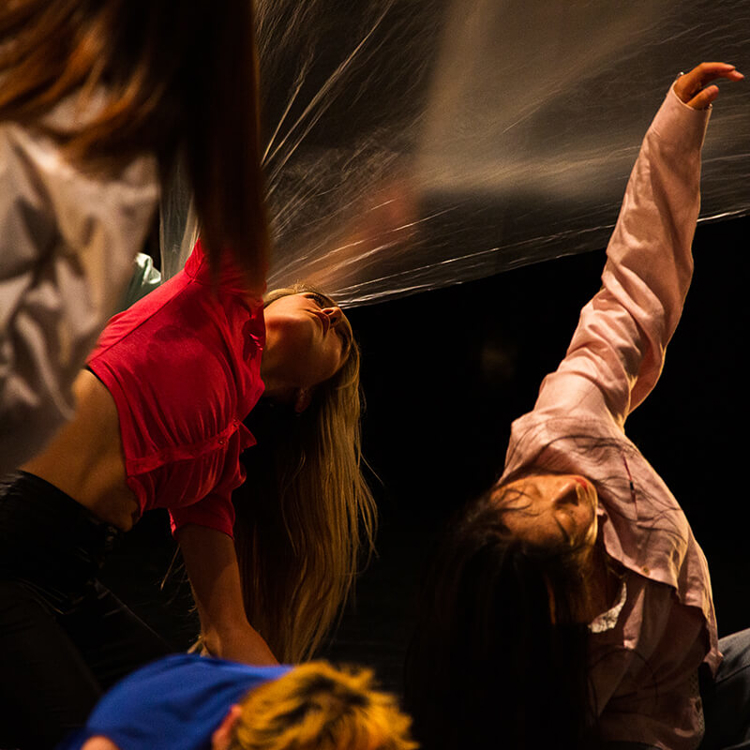
Learning and assessment
How you’ll learn:
Your learning is practice-centred and designed to prepare you for professional life as a choreographer and dance artist. You’ll work in specialist studios, seminar rooms, digital labs, theatres, and site-specific locations.
You will learn through:
- Studio-based exploration that develops advanced technical, creative, and embodied skills.
- Dialogue, collaboration, and independent investigation, including sharing your own work and responding to others.
- Critical, contextual, and interdisciplinary study, linking studio-based practice with wider research, cultural questions, and creative enquiry.
- Professional-facing activities such as feedback models, live and digital presentation skills, and responses to real-world briefs.
- Collaborative projects, in which you regularly create work with peers.
- Individual tutorials in every module, with extensive one-to-one mentoring.
- Guest professional workshops and field trips that connect your learning to current industry practices.
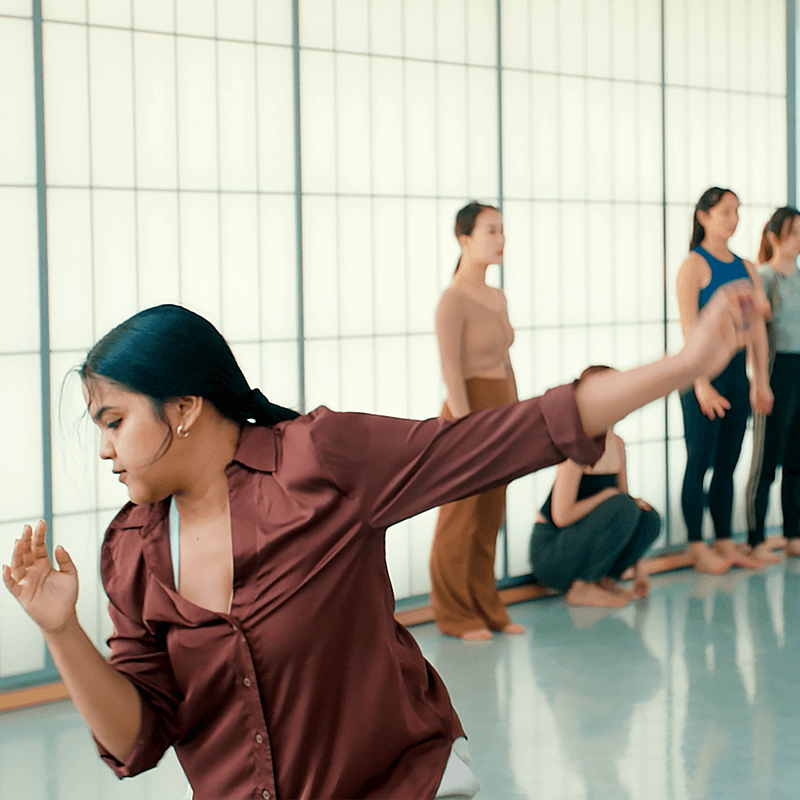
How you’ll be assessed:
You’ll experience a range of assessments designed to prepare you for professional practice and showcase your artistic voice.
These include:
- Practical presentations of choreography and embodied knowledge
- Facilitation and collaborative tasks
- Digital portfolio development
- Written reflections and critical discussions
In choreography modules, your first year focuses on smaller assessments that explore ideas, expression and form. By your second year, you’ll take on a substantial independent project that allows you to apply those explorations in greater depth and through your artistic voice.
You’ll take an active role in shaping the criteria used to assess your work, helping to ensure they reflect your artistic goals and the methods you’ve developed. You’ll take on key organisational roles, such as planning technical rehearsals or curating performances. Some tasks will involve reframing industry practices, such as funding bids or applications to present work, preparing you for real-world opportunities.
Your final project will showcase your artistic work for professional or pre-professional contexts. By the end of the programme, you’ll have strengthened your artistic and professional voice, becoming a confident communicator, and creator with strong research skills and contextual knowledge.
Course staff
You will be taught by artists and researchers who are leading specialists in their fields and provide an excellent springboard for you to thrive in your career in dance and the arts.
Dance spaces and studios
Large state-of-the-art, purpose-built dance and teaching spaces, designed for dance classes, workshops and movement exploration. Equipped with highly-sprung harlequin floors and underfloor heating.
A dedicated, well-equipped dance studio, perfect for practical dance classes and rehearsals. Equipped with highly-sprung harlequin floors, and a large TV for presentations.
Modern and accessible teaching space supporting dance theory, workshops and rehearsals.
Multipurpose hall, used for workshops, rehearsals and choreographic sharing.
Large and historic (18th-century) room used for teaching, special events and occasional performances.
Professionally rigged 350-seat theatre providing a first-rate performance venue for showcases and productions. Equipped with highly-sprung harlequin floors. Used for teaching, rehearsals and performance.
High-quality dance studio equipped with technology for rehearsals, choreography development, installations, and interdisciplinary creative practice. Equipped with highly-sprung harlequin floors and lighting rig.
Computer labs with extensive software for audio-visual editing of film and sound, and a 95-seat cinema.
Open days
Get a real taste of our campus, community and what it’s like to study at Roehampton
Applying
UK postgraduate students apply through our direct application system.
Specific entry requirements
Applicants are required to provide a video with one or two examples of recent choreographic practice. The work should be accompanied by a short statement which reveals the applicant's intention and interest in making this particular work.
General entry requirements
International postgraduate students apply through our direct application system.
Specific entry requirements
Applicants are required to provide a video with one or two examples of recent choreographic practice. The work should be accompanied by a short statement which reveals the applicant's intention and interest in making this particular work.
General entry requirements























